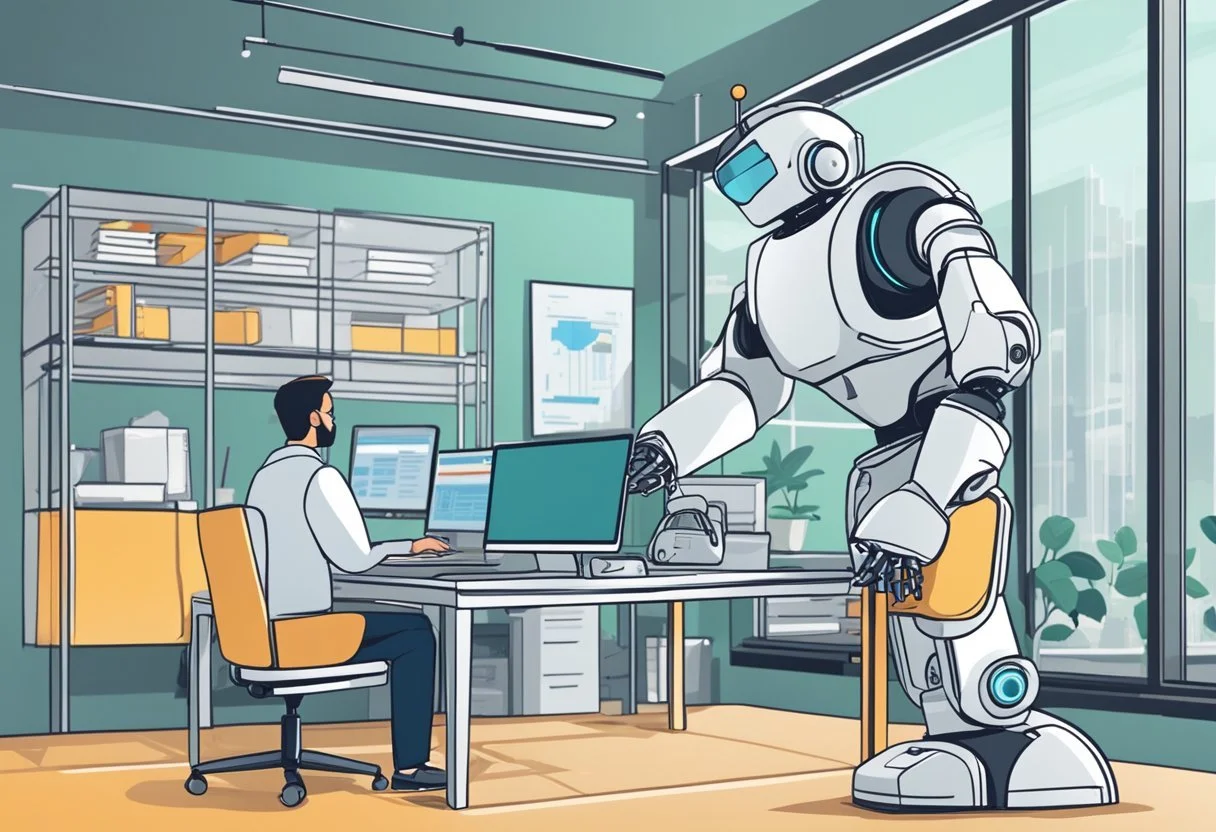AI in Daily Life: Navigating the Future with Intelligence
Artificial intelligence has seamlessly integrated into our daily lives, far beyond the realms of science fiction and into the practical, everyday tools we all use. From voice-activated personal assistants to sophisticated recommendation systems on e-commerce websites, AI technologies are enhancing human capabilities and automating tasks that were once time-consuming or impossible for machines. These advancements are not just for the tech-savvy; they affect everyone. They enable smarter home automation, more efficient energy use, personalized entertainment experiences, and even help in managing personal finances.
The ubiquity of AI in the digital age has ushered in a new era of convenience and personalization. Ordinary individuals often leverage AI without even realizing it, as the technology operates behind the scenes of many services. For instance, machine learning algorithms improve the accuracy of weather predictions, while natural language processing allows for real-time translation services, dismantling language barriers in communication.
Awareness and understanding of AI's role in everyday activities can inform better choices about privacy, security, and ethics. As people become aware of the extent AI affects their daily routine, they can appreciate the benefits while being mindful of the potential risks and implications. This understanding is crucial as AI technology continues to evolve and become even more ingrained in daily life.
Defining AI
Artificial Intelligence (AI) encompasses the creation and application of algorithms in a computer, a digital computer, or a computer-controlled robot to perform tasks commonly associated with intelligent beings.
AI Fundamentals
AI operates on the principle of simulating human intelligence in machines. The goal of AI is to enable machines to perform tasks such as reasoning, learning, problem-solving, and perception. Central to AI are algorithms, which are sets of rules or instructions that direct the AI in making decisions and learning from data.
Branches of AI
There are several key branches of AI that define the technology's scope and capabilities:
Machine Learning: This branch uses statistical techniques to give computers the ability to "learn" from data.
Natural Language Processing (NLP): Deals with the interactions between computers and human language.
Robotics: Involves the creation of physical systems to perform tasks autonomously or semi-autonomously.
Expert Systems: Designed to make decisions in real-life situations by simulating the judgment and behavior of a human or an organization with expert-level knowledge.
AI Versus Machine Learning
While often used interchangeably, AI and Machine Learning (ML) are distinct concepts. AI is the broader concept of machines being able to carry out tasks in a way that is considered "smart" or intelligent. In contrast, ML is a subset of AI that entails the use of statistical methods to enable machines to improve at tasks with experience. ML algorithms use historical data as input to predict new output values, a process distinctly different from the broader application of AI in various fields.
AI in Daily Technology
Artificial intelligence has seamlessly integrated into everyday devices, enhancing user experiences and personalizing interactions.
Smart Assistants
Smart assistants have become ubiquitous in homes and mobile devices, with AI enabling voice recognition and natural language understanding. They schedule appointments, set reminders, and even control other smart home devices, making daily tasks more manageable.
Recommendation Systems
Recommendation systems, powered by AI, help users discover new content and products. Companies such as Netflix and Amazon employ sophisticated algorithms to analyze user behavior, providing tailored recommendations that improve over time as the system learns individual preferences.
Autonomous Vehicles
The automotive industry is rapidly advancing with the help of AI in the development of autonomous vehicles. These cars and trucks rely on AI for navigation, obstacle detection, and decision-making, aiming to increase safety and efficiency in transportation.
AI in the Workplace
Artificial Intelligence is transforming the way tasks are performed in the workplace, enabling unparalleled data analysis, and unlocking new avenues for creativity. These impacts are profound across various sectors, enhancing efficiency and driving innovation.
Automation of Tasks
AI excels in automating routine tasks, freeing up employees to focus on more complex work. For instance, AI-powered tools can handle scheduling, customer inquiries, and even manage inventory. The use of AI in processing routine paperwork has led to more efficient workplace operations, as highlighted in the BBC's coverage of AI’s role in the workplace.
Data Analysis
In terms of data analysis, AI systems analyze vast amounts of data with superior speed and accuracy. They identify patterns and insights that humans might miss or would take much longer to uncover. Industries ranging from healthcare to finance leverage AI for data-centric decisions, which is detailed in ZDNET's explanation of AI in the workplace.
Enhancing Creativity
Creativity isn’t just an innate human trait anymore; AI is helping to expand the creative horizons in the workplace. Whether assisting in design, content creation, or proposing novel solutions, AI acts as a collaborative tool. This aspect is especially underscored by the variety of applications documented by the New York Times, showcasing how real people use AI in innovative ways.
AI in Healthcare
Artificial Intelligence (AI) is revolutionizing the healthcare industry by enhancing diagnostic accuracy, tailoring treatment plans to individual genetic profiles, and improving surgical outcomes through robotics.
Diagnostic Tools
AI-driven diagnostic tools are crucial in identifying diseases by analyzing complex medical images. Algorithms trained on vast datasets can now pinpoint issues such as tumors in MRI scans with impressive precision. For instance, some AI applications are capable of analyzing medical images with technology that discriminates between healthy and diseased tissue, aiding clinicians in developing treatment plans.
Personalized Medicine
In personalized medicine, AI algorithms take into account an individual’s genetic makeup, lifestyle, and other factors to propose customized treatment regimens. These sophisticated systems can predict disease progression and plan personalized therapies, potentially leading to better health outcomes. AI's predictive power is being used to forecast the course of diseases through a range of medical and healthcare data.
Robotic Surgery
Robotic surgery integrates AI to enhance the accuracy and precision of surgical procedures. Surgeons use AI-powered robots to perform complex surgeries with minimal invasiveness, which can result in quicker recovery times and reduced hospital stays. AI assists in decision-making during surgeries and supports diagnostic processes, ensuring a high level of precision that surpasses the traditional methods.
Artificial Intelligence, through these applications, is set to continue transforming healthcare into a more efficient, precise, and personalized field.
AI in Social Media
Artificial Intelligence is shaping social media by enhancing content moderation, refining targeted advertising, and personalizing the user experience.
Content Moderation
AI tools are critical in identifying and filtering out inappropriate content on social media platforms. They use complex algorithms to scan vast amounts of information, flagging or removing content that violates community guidelines. Forbes discusses how these AI tools assist in managing the ever-growing need for content moderation across numerous use cases.
Targeted Advertising
Through the analysis of user data and behavior, AI enables advertisers to target their campaigns with precision. AI algorithms predict what content will interest which users, boosting the relevance and effectiveness of ads. This is expanded further in TechTarget's article about The impact of AI on social media.
User Experience Personalization
AI is at the heart of the user experience on social media, tailoring content feeds to individual preferences. Each person's interactions on platforms like Instagram, TikTok, or Facebook shape their unique content feed, as detailed by Kapwing's resource on AI for social media. This personalization ensures that users are more likely to engage with the content they see.
Challenges and Considerations
Incorporating AI into daily life presents a complex array of challenges and considerations. Users and developers alike must navigate issues surrounding privacy, ethical implications, and the ever-present concerns about bias and fairness.
Privacy Concerns
Privacy remains a paramount concern in the age of AI. Personal data fuels AI systems, and there's a delicate balance to maintain between personalization benefits and privacy intrusions. The Pew Research Center highlights that the public is becoming more aware of their interactions with AI, which often involve the processing of their personal data. AI applications must be designed with robust privacy protections to maintain trust and compliance with data regulations.
Ethical Implications
AI's ascent brings ethical implications that must be considered, from the potential for job displacement to the broader impact on society. Developers and stakeholders grapple with these issues, recognizing that with great power comes the responsibility to direct AI's influence towards positive societal outcomes. Initiatives by institutions like UCLA Medical Center to use AI for cancer prediction showcase the potential for AI to be employed in life-enhancing ways while stirring conversations about the ethical use of such technology.
Bias and Fairness
Bias in AI systems is a critical challenge, as these systems often reflect the biases present in their training data. Ensuring fairness requires a concerted effort to identify and mitigate bias, and to develop AI that is equitable for all users. Reports from sources like POLITICO illustrate the subtle ways in which AI is changing everyday life, necessitating a keen focus on fair and unbiased AI development to prevent systematic inequalities from being perpetuated.
Future of AI
The evolution of artificial intelligence is continuously shaping various sectors, with emerging trends and significant implications for the job market and society at large. The long-term impact of AI advancement is poised to redefine the human-machine interaction.
Trends and Innovations
Innovations in AI are often focused on improving efficiency and expanding capabilities. Companies are integrating AI-driven analytics to garner deeper consumer insights. Progress in natural language processing enables machines to understand and respond to human language with greater sophistication. On the horizon, quantum computing may further amplify AI's processing power, potentially solving complex problems in a fraction of the time currently required.
AI and the Job Market
AI's influence on the job market is undeniable. It has transformed traditional recruiting methods, where video interview tools assess candidates beyond their resumes. There is a surge in demand for AI literacy across professions, highlighting the need for skills in managing and working alongside AI systems. Employees are tasked with adopting new roles that AI cannot fulfill, often those requiring human empathy and creativity.
Long-term Impact
The long-term impact of AI is anticipated to reach beyond mere automation. It is expected to work as an augmentation of human intelligence, assisting in complex decision-making processes. Ethical considerations are becoming paramount, with discussions focusing on the need for governance frameworks to ensure responsible AI development and deployment. Society must prepare for these changes, considering both the potential benefits and the risks associated with AI's pervasive influence.





